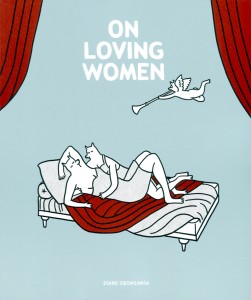 On Loving Women is a collection of 10 lesbian coming out stories from artist and animator Diane Obomsawin. Each story is simply titled as in, “Mathilde’s Story” or “Charlotte’s Story,” and told in a very simple set of declarative sentences, such as, “In high school I dated guys because that’s what everybody did,” and, “She was furious. She yelled at me in the hall.” The simplified narrative style helps bridge the gap between reader and storyteller, allowing direct access to the various stories of sexual awakening and coming out as a lesbian.
On Loving Women is a collection of 10 lesbian coming out stories from artist and animator Diane Obomsawin. Each story is simply titled as in, “Mathilde’s Story” or “Charlotte’s Story,” and told in a very simple set of declarative sentences, such as, “In high school I dated guys because that’s what everybody did,” and, “She was furious. She yelled at me in the hall.” The simplified narrative style helps bridge the gap between reader and storyteller, allowing direct access to the various stories of sexual awakening and coming out as a lesbian.Obomsawin’s art is at turns both rough and elegant, but always simple and expressive. I was reminded at times of Matt Groening’s early Life in Hell work, before he hit it big with “The Simpsons.” However, this comparison might be misleading, because Obomsawin’s simple art style serves to impart a poetic cadence to her work, and she eschews cheap laughs for emotional truths.
The characters in the book are drawn as anthropomorphic animals, the comic artist’s trick for instantly connecting to her audience, because it bypasses our prejudices and preconceptions. Obomsawin uses this technique to excellent effect in the very first story, when her subject Mathilde confesses that she has always been attracted to women with horse faces, and the artist obliges by characterizing the objects of her infatuation and love as anthropomorphic horses.
This is a book for adults; Obomsawin does not shy away from nudity, profanity or depictions of sex when the story calls for it. However, her simple style works to prevent a casual prurience when reading, so even when the scenes become charged with eroticism and sexuality, we see the characters as persons rather than objects. The range of sexual expression and contact depicted runs from innocent, accidental contact in the hallways of middle school to a raucous lesbian three way in which the storyteller falls out of bed.
The author was born in Montreal, but spent her first 20 years living in France. This French/Canadian perspective lends Obomsawin’s world a pleasing alienness to my American, New England eyes. Most of her previous work as a comic artist and animator has been in French. Only this and her previous work, Kaspar, about the life of mysterious orphan Kaspar Houser, are available in English. (Kaspar, incidentally, is also a 2012 animated movie by Obomsawin that is well worth a look. You can find it online by searching for “Kaspar” and “Obomsawin”).
Obomsawin’s work demonstrates an intuitive ability to convey the interior world of her subjects. The work I’ve seen of hers has all been biographical in nature, but the grounding of her biographies is in the psychological rather than historical realm. In part, she foregrounds the psychological by obscuring the history. For instance, the stories in On Loving Women feel contemporary, but interior clues show that they take place all through the late 20th century. Kaspar tells the true story of a man who lived in 1828, but is contemporized with odd, anachronistic details such as automobiles.
As with the simplicity of her artwork, Obomsawin’s erasure of historical detail and her insistence on immediacy serve to connect us with her characters and generate understanding of her subjects as persons. This is the purpose, after all, of literature, to expand our empathy for others and to learn something of what it means to live another life. On Loving Women is a set of simple, beautiful stories, at turns sad and inspiring, banal and fantastic, designed to teach us about each other. Highly recommended.

